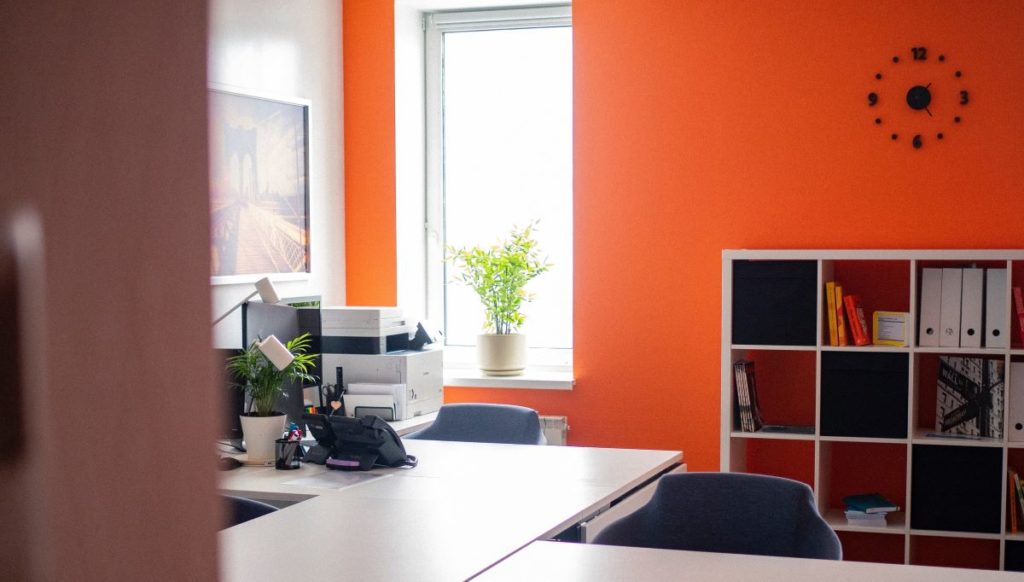Photo by Pavel Chusovitin on Unsplash
The Small Business Administration (SBA) considers employee headcount, income, and industry when it determines its definition of “small business.” While the companies within the SBA list may have few shared attributes, all small businesses have one thing in common: the need to be frugal with money. Whether you’re a solopreneur, running your business from your home—or if you employ 1,500 people in one or more facilities—the space your business uses can be costly in many ways.
Depending on location and other factors, the space your company occupies could cost more than ten thousand dollars annually per employee. Your business will not run effectively if you skimp too much on space. However, you should certainly find ways to use every inch wisely. The following ideas can help you avoid wasting space so you will have more resources for money-making activities without relinquishing employee comfort.
RELATED ARTICLE: 3 IMPORTANT CONSIDERATIONS WHEN PLANNING AN OFFICE RENOVATION
Make Full Use of The Space You Have
When considering ways to maximize your current space, you should understand that floor area does not fully define the space that your company occupies. When looking to add storage capacity, for example, think vertically. Naturally, items needed frequently should remain within easy reach of your team. However, you can keep any seasonal items, from tax records to winter holiday decorations, higher up. As long as a safe ladder is easily accessible, the slight extra effort is manageable.
Of course, it’s also important to assess how you use floor space. If no one eats in your lunch room, why not convert it to a smaller snack area that is just large enough to house your coffee station, a refrigerator, and the sink? If some of your conference rooms are usually empty, perhaps you might convert them to the space that you need for new hires.
Always observe how your current space is being used. Before opting to expand the building or move, the chances are that you can find other ways to make things more comfortable.
Allow the Internet to Replace In-House Equipment
Thanks to the Internet, digital options abound. Save counter space in your mailing area and reduce the cost of postage by printing your own stamps and shipping labels. If you happen to work in an industry that still requires faxing, avoid the space of a physical machine, along with the costs of maintenance and supplies, by choosing an online alternative.
Look at all of the equipment that currently takes valuable space from your workplace, then search for online alternatives. Of course, you want to conduct a similar search before you buy more equipment. As an extra bonus, online alternatives allow your team members to remain at their desks, rather than running off to deal with a physical machine.
Reduce Paper
Going fully paperless might be a dream. But storing paper files takes valuable space and carries myriad other expenses and inconveniences, including how much it costs to retrieve paper files that might be more quickly accessible from a computer.
Always look for ways to reduce paper storage. For example, if you currently maintain detailed customer files, a Customer Relationship Management (CRM) system makes the most current information available from any device. Of course, if you currently keep paper copies of customer orders and invoices, the online systems that you undoubtedly use provide all the information you need. Be sure to perform regular backups to protect your most valuable information.
Permit Reliable Employees to Work From Their Homes
Not all employees can work from home. Some need to be in the workplace to properly serve visiting customers. Others do not have the discipline to work productively without supervision. However, many employees can work from home, as long as you provide a few temporary workspaces where they can hang their hats when they have to be in the office.
Statistics show that telecommuters are typically more productive, while being less expensive for their employers. Provide them with appropriate equipment, give them secure access to your computer network and phone system, then add meeting software, and you might forget that they aren’t physically present.
Small Changes in Space Utilization Can Add Up to Big Savings
There is no doubt that you need to choose your space wisely to get the best return on investment over a long time period. Similarly, when you consider the overhead costs of every square foot of space, you do not want to invest in significantly more space than you need to house your business.
With creative thinking, you can find many relatively small, low-cost changes that can add usable space as your company grows. Eventually, you may need to add space or move to a larger location … but not today.

